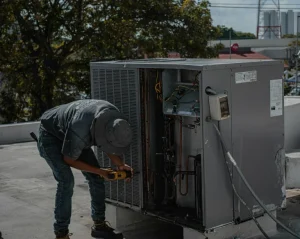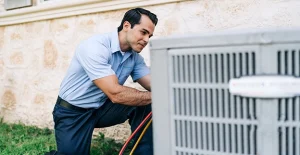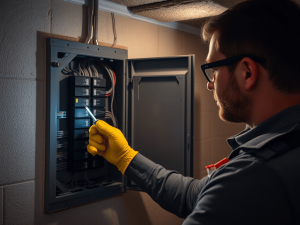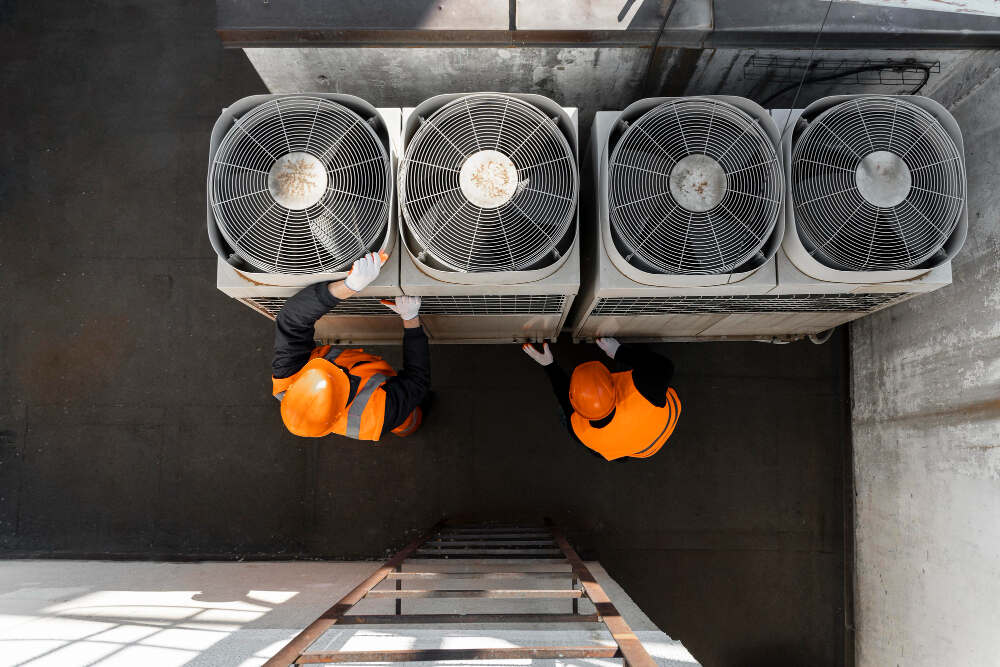Energy Efficient HVAC Systems
Energy Efficient HVAC systems are crucial in achieving and maintaining comfortable, healthy, and energy-efficient indoor environments. Indoor environments must be kept comfortable, safe, and healthy. Temperature, air quality, and humidity must be properly regulated, as well. HVAC, which stands for Heating, Ventilation, and Air Conditioning, encompasses all these. In this article, HVAC systems are discussed in detail, including their consideration and importance, as well as maintenance tips for peak performance.
Improveing Energy Efficient HVAC Systems
Managing HVAC systems (Heating, Ventilation and Air Conditioning) smartly comes with significant pecuniary benefits. These benefits accrue to businesses, facility managers, and even to those renting out commercial buildings. Improving the efficiency of your plant and machinery is another example: improving efficiency prolongs the plant’s and machinery’s operational life, which leads to long-term cost savings. In addition, many businesses want to work with environmentally conscious partners, and possessing green credentials helps attract such customers.
Importance Of HVAC System
Heating
As discussed above, HVAC systems include various heating structures for spaces and buildings in colder periods. HVAC systems include furnaces, boilers, and heat pumps. For central heating systems, they distribute heat through ductwork, while others provide direct warmth, including radiant floor heating. Regardless of the preferred heating technique, the outcome must be the same; a comfortable indoors irrespective of the outside temperature.
Ventilation
Ventilation systems retain and ensure the quality of air indoors by getting rid of stale air, unwanted odours, and other harmful contaminants. They are responsible for introducing new and fresh air to ensure indoor air pollution is kept to a minimum. Mechanical methods such as fans and air handling units as well as window and vent methods are both efficient. The indoor environment can efficiently be enhanced through proper space air balance to ensure moisture, circulation, and mould risks are dealt with.Air Conditioning
Air conditioning systems perform the dual function of cooling and dehumidifying spaces indoors in the warm months. They lower the heat and moisture in the air, creating comfort. There are air conditioners in the form of split systems, window units, and central air conditioning and the form to be used is determined by the size of the building, its location, and energy efficiency requirements.
Carry Out Energy Audits To Start Saving
An energy audit involves the collection of all energy bills over the past two years, or three if that’s possible. Graphical representation or spreadsheets can be useful to track energy consumption and identify saving opportunities. Other than seasonality, do energy usage and other variables show trends? Based on available figures, do energy-consuming assets like HVAC systems show increasing energy usage as they age? Understanding the energy consumption of the business helps in identifying issues and making the right interventions.Planned Maintenance Will Ensure That HVAC Plant Equipment Is Operated And Kept In Good Condition
Keeping both your cooling and heating systems working at peak efficiency will help you ensure energy costs under control. The best way to do this is to develop a programme of maintenance which aims to prevent problems from developing in the first place. The best way to control costs in plant operations is to control expenses on a proactive basis and that includes scheduled maintenance of the plant equipment.Explaining The Characteristics Of HVAC Systems Further:
- Air Quality Improvement: HVAC systems directly improve air quality by using filters and purifiers which remove harmful constituents of air.
- Temperature Control: HVAC systems maintain temperatures as per the requirements all through the year.
- Humidity Control: Controls excessive moisture and the chances of mould and mildew.
- Cost Control: Advanced models of HVAC systems help with reduced consumption and expenditure.
- Life Extension: HVAC systems can maintain configurations for efficient operations which help with regular servicing, and improves longevity.
HVAC System Maintenance For Effective Operation
- Regular Inspections
- Replacement of Filters
- Checking air filters every one to three months for replacement and maintenance guarantee optimal air flow, and reduces the workload on the HVAC system.
- Cleaning Components
- Maintain the system in optimal working order to reduce the risk of contaminants’ build-up and preserve the efficiency of the system for usable devices as well as fresh air to breathe for users.
- Professional Servicing.
Our HVAC Services
- Design and Installation: Installation of Custom-made ventilation or air conditioning systems fully compliant to your organization’s requirements and perfectly designed for your business is done by us. Be it upgrading an existing simple system or installing a full VRV or VRF system, we achieve results beyond expectations.
- Preventative and Reactive Maintenance: Every business has different requirements, and so do the maintenance services. Regular system maintenance ensures the air conditioning systems or ventilation systems remain functional, reducing the chances of costly faults and repairs. Emergency support is always available through dedicated hotlines and standby maintenance teams, ensuring prompt action during emergencies.
- Repairs: Emergency call-out services are available around the clock, so business operations are maintained with as little disturbance as possible. HVAC faults and breakdowns are quickly and accurately diagnosed and repaired by professional engineers.
Typical HVAC Issues And How To Solve Them
- Reduced Efficiency
- Obstructed filters and ducts diminish airflow. Most issues concerning airflow are resolved through cleaning and replacing necessary filters.
- Discrepant Conditions
- Discrepant temperatures often result from poorly sized systems. Issues such as these are taken care of with a professional.
- Costly Bills
- Obstructed filters and ducts diminish airflow. Models that are older often waste lots of energy during operation.
Overconsumption Of Energy In HVAC Systems
- Various Factors can lead to HVAC system Energy Consumption Overconsumption.
- Improper sizing and poor building insulation causes poor HVAC system insulation alongside undersized HVAC Systems to Increase system energy consumption up to 30%.
- Improper insulation and unsealed gaps between building envelopes leads to unconditioned air penetrating and unconditioned air leaking.
- Conditioning Systems which focus on the building needs and proper design installation lead to systems which overlook the buildings needs tend to function at a bare minimum.
- As well as unreasonably high energy consumption due to HVAC system fully functioning, extreme temperatures and high internal heat increases demand.
- Vanishing system details and concentrating on systems requiring the peak load Engineering pose a problem, leading to the systems functioning at optimal and unreasonably high levels energy consuming.
Air Handling System
Economy mode (free cooling): This mode utilizes outside air cooling – free cooling – and applies to AHUs when outside air temperature is lower than indoor temperature. This saves energy and reduces air conditioning costs.Variable air volume (VAV) controls: Through VAV controls, AHUs can deliver air into different zones in a building depending on a number of demand factors such as occupancy, temperature, or even air quality. This increases comfort and reduces energy expenditures. Air conditioning and/or ventilation supplied as demand dictated is Ventilation Efficiency, in contrast to the old style of constant air volume.It is more efficient to deliver air at lower than high velocity through small ducts. Steps related to air handling unit maintenance as energy efficiency safeguards include:- Refresh cleaning of water air heat exchangers.
- Test and repair panel and coil air and pipe water leak boundaries.
- Control damper linkages to ensure no closure and verify leak proof dampers.
Energy Recovery Unit
An HVAC energy recovery wheel is meant for capturing waste heat in air exhaust streams to be used to preheat or pre-cool fresh air coming into the system. This process not only conserves energy but also improves the fresh air supply indoors. A recovery wheel rotates between the air streams to be treated, incrementally transferring heat and moisture between them. During winter, the wheel extracts heat from the exhaust air to recover and warm the cold air coming in. In the summer, the wheel removes heat from the incoming air to reduce cooling loads.

